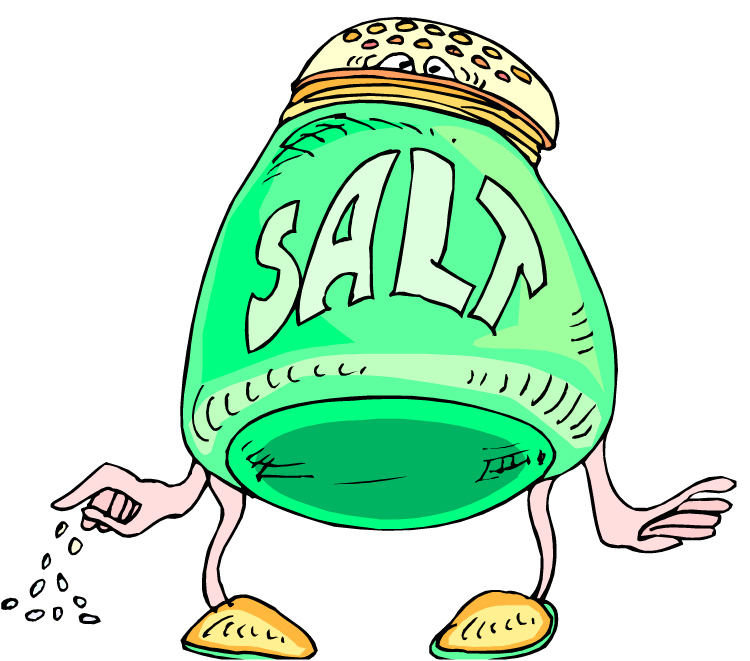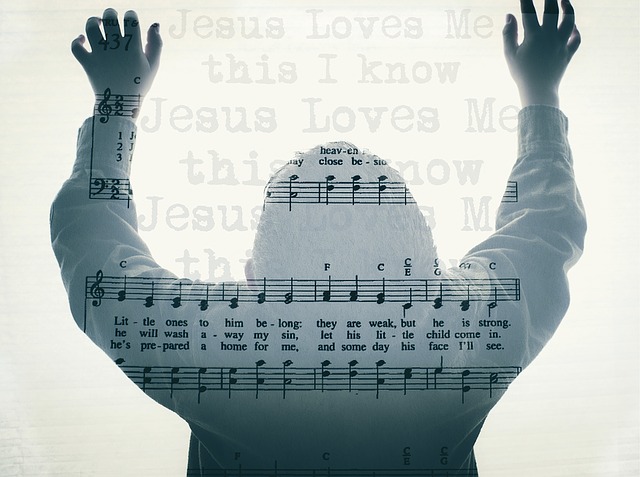Category Archives: Christian Church
Are you too salty for those around you?

Holy Provocateurs—YHVH’s Human Agents to Wake People Up
From the beginning of time, YHVH has raised up secret human agents and sprinkled them—like grains of salt in a wound—in various places at various times to be his mouthpieces to warn humans to repent of their sin and turn to him. These divinely appointed pot-stirrers have been thorns in the sides of both sinners and YHVH’s lukewarm saints. They are his agent provocateurs slipped into the ranks of humanity to incite, provoke and stir humans to action. Are you such a person, or do you know someone like this, who, quite frankly, is nettlesome and irksome to be around? Whether we like it or not, these individuals are simply YHVH’s mail carriers, carry his message of repentance to a sin-sick world.

These agents, who are part of the Creator’s secret service, are unusually zealous and passionate for YHVH. Their mission is to warn people away from evil and to encourage, no, rather irritate them toward him. These people have never been popular, but have typically been barely tolerated by their contemporaries, if not outright hated and rejected. Typically they are loners and have few if any friends. At the very least, they have been nettlesome thorns in the sides of those around them, and at the most have been hated, despised, hunted down and even killed, while often being viewed as a pariah and anathema to society. The problem is that this is their calling and mission, and they cannot run from it. They are YHVH’s divine mail carriers, and to reject them is to reject the Creator himself. Such biblical holy provocateurs whose divine mission was to warn people of impending judgment and to call them to repentance include such notable biblical personalities as Noah, Elijah, Jonah, Jeremiah, John the Baptist, Stephen and, most notably, Yeshua the Messiah himself. Despite their unpopularity, these provocateurs have been significantly impactful at chiding, if not scaring, people toward repentance and a more holy, Elohim-centered spiritual walk.
Elohim’s provocateurs are often viewed by those around them as holier-than-thou kill-joys, legalists, Jesus-freaks, Bible thumpers, religious fanatics and zealots, and the list of pejorative terms thrown at them goes on and on. It boils down to this: If you can’t deal with the sin issues in your life, then project your guilty conscience onto the preacher who is calling you to account by labeling him or her with some derogatory epithet. In this way, you somehow justify your sin by transferring onto them your anger as you resort to ad hominen attacks. As a longtime pastor, I witnessed the employment of this tactic countless times by disgruntled congregants. If they could not argue against the biblical Truth you were preaching, then they would attack you personally by criticizing your style of preaching, the length of your sermon, your hairstyle, how hard the chairs were or how hot the building was in summer…and when they had exhausted their arsenal of verbal grenades, off they huffed to terrorize another pastor and congregation somewhere else.

All of this is because YHVH’s provocateurs have the dubious distinction of acting as a sort of societal conscience and moral compass as they go about constantly telling people to turn away from sin and the idolatrous pleasures of this mortal existence and to turn back to the true north of YHVH’s Truth. They passionately declare that the love of this world is enmity with Elohim, and their call to turn away from the mortal, sinful pleasures that are the heartbeat of sinners and to lukewarm saints, and to turn to righteousness and holiness is a perennially unpopular message.
Not everyone is called to the ministry of being a heaven-sent secret agent provocateur, and very few people understand much less appreciate the role that these troublesome individuals play in YHVH’s spiritual economy. Moreover, why would anyone choose to be a divine thorn in the side of humanity? Such people only become targets for hatred, derision, scorn, mocking, rejection, persecution and even death. Who in their right mind would ever choose this as a spiritual vocation?
And being a provoker has never been a popular job. Only a smattering of people have will every heed the divinely mandated warnings of these provocateurs. These human hammers in the hand of the Almighty to smash the hard rock of the sinner’s heart (Jer 23:29) are in the company (though not at the same level) of such biblical giants of Noah, Elijah, John the Baptist, Yeshua, Stephen Paul, and the apostles and all of the other prophets. Even Yeshua’s own brothers rejected him until after his resurrection which was undeniable proof of his divinity.
These provokers never chose this calling; rather, YHVH chose them and compelled them to fulfill their mission to warn those around them. Till the present time, he has had such people sprinkled all over the earth, strategically positioned in all social stratum and geographical locations. They are there to warn sinners to repent, and on judgment day, no one will be able to accuse Elohim of not warning them.
The following is a list of Scriptures that refer to such people whose divine mission is to stir up, provoke, incite, irritate (involving contention and disputation) one another to love and to good works as per Hebrews 10:24, which is the flagship passage of this teaching. There we read,

And let us consider one another in order to stir up [i.e., to provoke, irritate, incite] love and good works…
To be sure, some of YHVH’s provokers are more salty than others. As we all know, salt in a festering wound, though a cleansing agent, can be a painful irritant. With this in mind, Yeshua declared of his disciples,
Continue readingKorah the Malcontent, Rebel and a Leftist

As we watch the rise of violent rebellion and civil disobedience in western—formerly Christian—nations (and elsewhere), it would behoove us to determine what is at the root and core of this movement, so that we can determine its source and what our response should be.
Human nature has never changed from the beginning of human history to the present. What is happening today has happened before. Only the actors, costumes and theater venues have changed, but the story’s plot is the same from the tree of knowledge in the Garden of Eden until now.
This ever-repeating and sad never-ending story goes like this: Elohim the Creator laid down certain rules and guidelines for humans to follow for their own blessing and well-being. Along came a snake in a tree to dissuade humans to rebel against Elohim’s rule of law, and rebellious and malcontented humans egged on by the same God-hating snake (that is, Satan the arch-rebel) have been marching to the same drum beat ever since.
We see the modern manifestations of this same satanic rebellion in the various current leftist movements that, like the many-headed Hydra of ancient Greek mythology, have many faces: leftism, atheism, secular humanism, moral relativism, socialism, the rise of the nanny-state, the rise in democratic mob rule, race wars, the attack on Judea-Christians values, the rise of false and Antichrist religious systems, evolution, rebellion against western culture and history and so on.
This is not to say that western culture is perfect and that there aren’t systemic problems that need fixing, and that some of the issues of the leftist malcontents aren’t legitimate. Indeed, there are problems that need fixing, but left’s solution of destroying the biblical foundations of the west is not the answer to the problem. It is like destroying the entire garden for the weeds growing therein. The problem is that the left generally wants to kill, steal and destroy in its effort to supposedly correct the problems in western societies that despite their weaknesses have generally done more good than harm in improving the human condition when held up against the backdrop of human history. And the left has no solutions to the problems in western culture. Their only solutions is societal upheaval and destruction—again to kill, steal and destroy. They cannot point to a single example past or present where their ideologies have worked. No. In the wake of leftist ideals, there has always been mass bloodshed, anarchy, mayhem, repression, loss of freedom, enslavement and loss of civil liberties. Always! Think Marx, Lenin, Stalin, Hitler, Mao, Castro, North Korea, Pol Pot and the sorry list goes on and on—just in the twentieth century alone!
To understand the evil spirit that is behind modern leftism, let’s go way back in time to the dusty pages of biblical history to one of the earliest leftists—Korah the malcontent. When we study his character, life and methods of operation, we will see many parallels between him and the modern rabble rousers who are trying to turn society on its head and usurp authority for themselves no matter the means or the cost.
The Spirit of Korah
The biblical story of Korah occurs in Numbers chapter 16. There we read,
“And they rose up before Moses, with certain of the children of Israel, two hundred and fifty princes of the assembly, famous in the congregation, men of renown: and they gathered themselves together against Moses and against Aaron, and said unto them, ‘You take too much upon you, seeing all the congregation are set apart/kadosh, every one of them, and YHVH is among them: wherefore then lift ye up yourselves above the congregation of YHVH?’” (Num 16:2–3)

The righteous must discern, identify and then oppose this evil spirit. Everywhere in every way, this demonic spirit of rebellion is attempting to destroy the work of YHVH Elohim on earth.
The spirit of Korah is currently alive and well on planet earth. The righteous must discern, identify and then oppose this evil spirit. Everywhere in every way, this demonic spirit of rebellion is attempting to destroy the work of YHVH Elohim on earth.
The spirit of Korah is the spirit of rebellion against YHVH and his divine authority and biblical truth. In our society, it is manifested in the philosophies of secular humanism, atheism, the New Age Movement, radical environmentalism, earth worship, so-called “progressivism,” socialism, Marxism and evolution, which are all aspects of the Babylon the Great, New World Order political-religious system that will oppose the saints of Yeshua and Yeshua himself at this second coming. We also see this spirit at work, supported and encouraged in international politics, in our own government, in our mainstream educational systems, in the major media, in the false religions of the world where foundational Judeo-Christian biblical values are being rejected and even demonized.
Continue readingThe Midterms R Not Our Hope—Make America Holy Again!
Woe to the Barkless Dog Christian Leaders
“In Vain They Worship Me”—Praise & Worship in the Church
Much of the praise and worship themes in the modern Christian church are incongruent with the biblical model and needs to be reoriented accordingly. Praise and worship is largely an emotional and not an action-based activity. In fact, very few of the lyrics, for example, of modern day praise and worship music even talk about fearing YHVH or walking in righteousness and holiness as it relates to obedience to his commandments. This is not how the Bible defines praise and worship as we shall discuss below. In true biblical praise and worship, the actions of the worshipper match his verbal proclamations.

Why should we worship Elohim?
Why humans should worship YHVH Elohim, their Creator, should be self-evident. But in the hectic flurry of daily living, it is helpful to reminded ourselves of the most basic element of human existence to acknowledge our proper place in the cosmos by giving acknowledgement and respect to the powers that be that are greater than ourselves. So here are some basic reasons why man should not only acknowledge, but respect and even fear his Creator.
- He made us.
- He is greater than us.
- There is no hope in this world outside of him.
- He demonstrates his love for us in countless ways such as placing us on this earth with all of the necessities of life.
- He demonstrates his love for us by offering us hope and redemption or salvation from sin (the violation of his laws) and escape from the lethal entrapments of this world, the flesh and the devil.
- He offers us escape from the cosmos (this time-space continuum space capsule) in which we are inexorably bound.
This is only a beginning. Countless more reasons could be given why humans are duty-bound to worship Elohim.
How Should We Worship Elohim?
The purpose of the following discussion is not to criticize or tear down all the good things that the Christian church has down or does. My purpose is to bring us all to the higher level and thus become a more pleasing bride to Yeshua our bridegroom by pointing out those things in the church that are incongruent with the Truth of Elohim as revealed in his Word.
That said, I have to admit that I am non-plussed by most of the praise and worship music and activities in the Christian church as well as most so-called Messianic and Hebraic worship music. Why? Doesn’t Elohim inhabits or is enthroned on the praises of his people and love it when they praise him (Ps 22:3)? Yes and no. But, there is a higher level of praise and worship that the church largely misses. Let’s explore and discuss this.
There are two kinds of ways to worship Elohim.
The first type of worship is through man-made religious activity—the commandments or doctrines of men. This is vain, empty or meaningless worship in the eyes of the Creator. As Yeshua said, “AND IN VAIN THEY WORSHIP ME, TEACHING AS DOCTRINES THE COMMANDMENTS OF MEN,” (Matt 15:9). This is from Isaiah 29,
Therefore the Lord said: “Inasmuch as these people draw near with their mouths and honor Me with their lips, but have removed their hearts far from Me, and their fear toward Me is taught by the commandment of men… (Isa 29:15).
On the issue of false, man-made worship, let’s note Matthew 15:8 and Isaiah 29:13 respectively,
Ye hypocrites, well did Isaiah prophesy of you, saying, This people draweth nigh unto me with their mouth, and honoureth me with their lips; but their heart is far from me. But in vain they do worship me, teaching for doctrines the commandments of men. (Matt 15:7–9)
Wherefore the Lord said, Forasmuch as this people draw near me with their mouth, and with their lips do honour me, but have removed their heart far from me, and their fear toward me is taught by the precept of men. (Isa 29:13)
The second form of worship is through spirit and truth.
Continue reading
